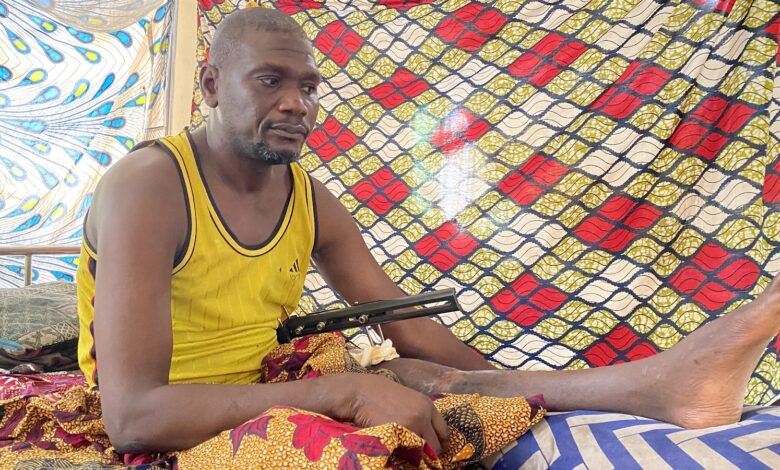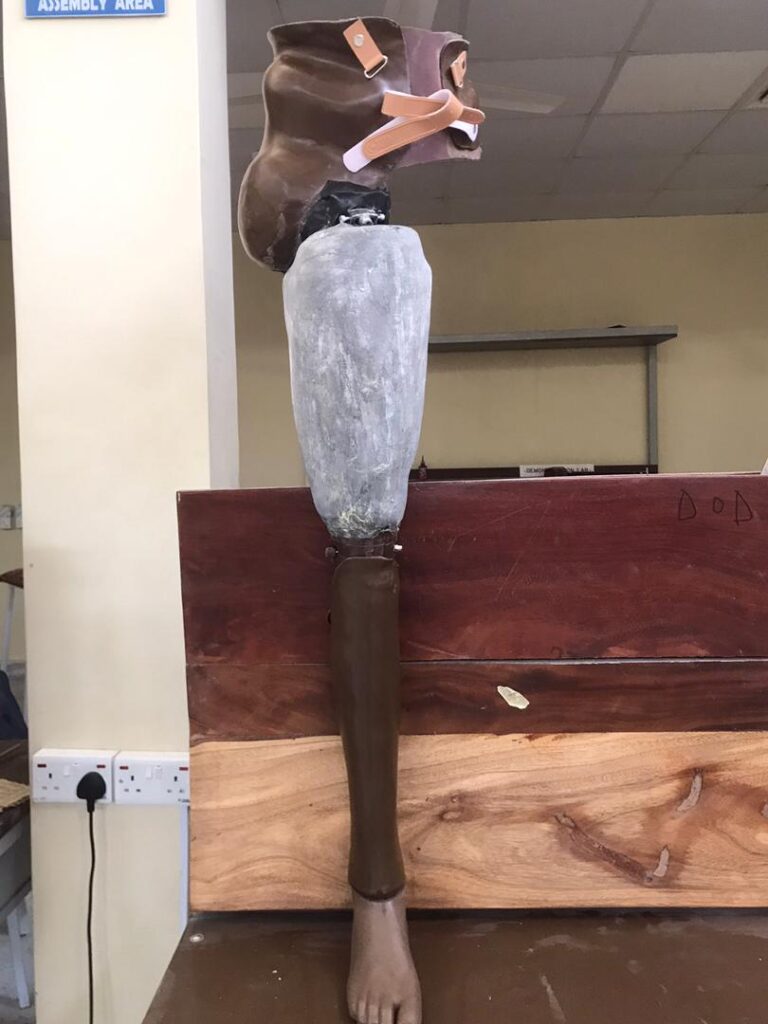Survivors Of Deadly Attacks In Borno Left With Gruesome Injuries
Ali Jigila survived a massacre that left him moving from one hospital to the next. Ashigar Abba Bukar lost a leg in an explosion that claimed lives. Their injuries happened in an instant, they survived, but the effects will last a lifetime.

“This was our community’s worst nightmare,” says Ali Jigila.
Five-and-a-half years ago, he survived the killings in Ndaba community under Kirawa ward in Gwoza Local Government Area of Borno State.
“An armed group invaded our community that day, gathered us and fired sporadic gunshots at all of us. Women, children, and elders were all among,” he told HumAngle, his voice quivering.
‘‘I thought I was dead because terror and bullets clouded us indiscriminately. I saw people crying in pain, and we were all helpless that day.
‘‘Sharp pain struck me all over my body, and I couldn’t walk because of the bullets that pierced my leg.”
While Jigila was in hospital, he received the news that scores of people had been killed, many more were injured.
He said, “103 persons died as a result of the incident and my community members honoured them with mass congregational prayer and buried them.”
Jigila remembered the killers dressed in Cameroonian military uniforms. As HumAngle has reported Boko Haram insurgents had launched other attacks during that period disguised as soldiers. On June 2, 2014, insurgents dressed as soldiers razed the villages of Goshe, Attagara, Agapalwa, and Aganjara in Gwoza LGA. The attack left at least 400 locals dead, with men and boys being prime targets. These attacks are believed to have been the work of Boko Haram insurgents.
The 45-year-old was a successful businessman before the incident that changed his fortune, Jigila is married to three wives who bore him 15 children.
The bullets, which hit Jigila’s left leg, had since made life difficult for him. “I passed through several hospitals. My money and everything have finished…my family members got tired of my condition, everyone left me,” he said.
“At some point, the NGO that was supporting me with medical treatment left me too. I went from one hospital to another, and it exhausted my savings, and I had to think about some of my assets,” he said.
Jigila’s current doctor, Dr. Ali Mohammed Ramat, an orthopaedic and spine surgeon consultant, explained that Jigila’s health requires special medical care that is expensive.
“Ali was a victim of gunshots, and there were bones lost and multiple fractures in his left thigh and hip,” Dr. Ramat said.
“He went through previous operations and spent a lot of money and, unfortunately, the fractures didn’t unite. He had to come back here.”
At the moment, Jigila is undergoing a series of medical operations in order to elongate the bone and unite it. The operation is expected to balance the height of the two legs.
Dr. Ramat added that medical treatment and immediate attention for such patients is vital because they could lose such a leg. Fortunately for Jigila, he is a beneficiary of Governor Babagana Umara Zulum’s Special Health Intervention Project (Z-SHIP) through the Borno State Contributory Health Management Agency (BOSCHMA).
Ashigar Abba Bukar, is currently studying statistics and final year at the University of Maiduguri, was a victim of suicide bombing that occurred five years ago in a mosque at the University of Maiduguri.
“I can’t forget the day because I was badly injured and I faced several consequences. For example, I missed school activities and eventually my leg was amputated,” Bukar said. Today he uses a prosthetic leg and remains grateful for being alive.

According to reports, the suicide bomber sneaked into the mosque’s premises and detonated the explosive strapped on his body. Four people were killed, including a professor. Seventeen others sustained serious injuries.
Curious object
There has not been a full accounting of how many survivors of such deadly incidents now live with life changing injuries, but the number must be very high.
And people are being maimed and left with life changing injuries, even long after an attack, and without even any terrorists or soldiers being present.
In Feb. 2022, four children playing outside in Ngala LGA of Borno state, found a curious object. As they played with it, the lethal device exploded. It was Unexploded Ordnance (UXO), a dangerous mine.
The four children survived the explosion, but they were all horribly maimed. One of the victims had his leg amputated, and others sustained serious wounds as a result of the explosion.
“Uwa, Umar, Hussaini, and Abdullahi were playing outside their home in Ngala when they found a strange object.” The International Committee for the Red Cross said of the incident in a tweet. “Unaware of what it was, the children were curious. The strange object turned out to be UXO and sadly detonated in their hands.” The ICRC transported the children by helicopter to Maiduguri for medical care in the Borno State Specialist Hospital.
The ICRC saved the victims’ lives. It offered them immediate medical attention and treatment after the incident. “The children received life-saving surgical care at the hospital, and they are in the recovery stage now,” the organisation said.
Explosive devices in populated areas are likely to have indiscriminate effects, they pose a great risk to the general population, the organisation says.
It stated that “Children are at high risk of death, injury, mental trauma and disability when they live in proximity to Unexploded Ordnance.”
This was the second such incident in the same area. In Aug 2021, a similar incident involving explosives occurred in the same Ngala community. The PUNCH reported that five children were killed by an exploded grenade.
The International Humanitarian Laws proscribed the indiscriminate use of explosive devices on civilian populations in armed conflict areas like Borno State.
The incidents in Ngala are an indication both state and non-state actors are not acting in line with the International Humanitarian Laws that are supposed to protect civilians in conflict.
Where is the help?
There are government-mandated organisations that are supposed to help victims of violence and humanitarian crises.
National organisations such as the Victim Support Funds (VSF) have a budget to support and alleviate the suffering of victims of terrorism and insurgency in Nigeria.
Newspapers publish stories about the numbers of victims the VSF has helped.
However, Jigila and Ashigar have not benefited from the funds.
While it was announced that many high-profile individuals had donated to the fund, the organisation does not publish its budget on its website.
HumAngle sent queries to the VSF in Borno to ask about the coverage of their programmes and if they knew how people might fall through the gaps, but we did not receive a reply.
Unprecedented consequences of armed conflicts can be mitigated if parties abide by the International Humanitarian Laws (IHL) and provisions that proscribe violent attacks on civilian populations, non military objects such as markets, worship centres, and hospitals.
In Nigeria, ICRC supported by the Nigeria Red Cross Society is mandated to share IHL to parties in armed conflict. This implies that conduct in times of war or non-international armed conflict must be adhered to by both non-state and state actors.
In Northeast Nigeria, the ICRC is known to educate state actors like the Nigerian military. The extent of its engagement with non-state actors, however, is unknown. Attacks conducted by members of armed groups in Borno shows that there has been little progress in that direction.
This report was produced under the HumAngle Accountability Fellowship, with the support of the MacArthur Foundation.
Support Our Journalism
There are millions of ordinary people affected by conflict in Africa whose stories are missing in the mainstream media. HumAngle is determined to tell those challenging and under-reported stories, hoping that the people impacted by these conflicts will find the safety and security they deserve.
To ensure that we continue to provide public service coverage, we have a small favour to ask you. We want you to be part of our journalistic endeavour by contributing a token to us.
Your donation will further promote a robust, free, and independent media.
Donate HereStay Closer To The Stories That Matter




